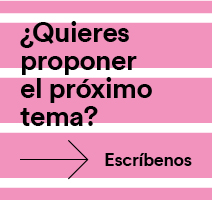Give your opinion
Archaeology in COVID-19 times
Ane Urrizburu, student of the double degree in Hi story an d Journalism Degree
of School Philosophy y Letras, brings us a brilliant interview with Javier Andreu,
Javier Andreu, Director of the Diploma of Archaeology of the
University of Navarra, on the future of Archaeology in the context of the pandemic.
in the context of the pandemic.
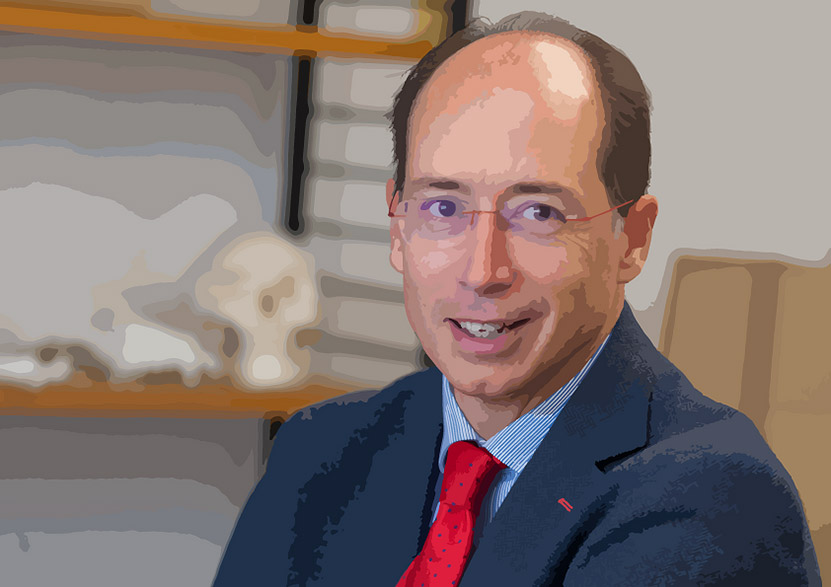
Javier Andreu Pintado, director of the archaeological excavations at Santa Criz de Eslava in Navarre, and of The Bañales of Uncastilloin Aragon, welcomes us to his office at the University of Navarre, where he is a lecturer and director of Diploma of Archaeology.
The challenges and opportunities of the past and present of the archaeological profession are unearthed for a future that "as far as challenge is concerned, will be exciting".
When we hear of archaeology, it is difficult to define it. We think of "ancient stones" and monuments... But what is archaeology?
There are two archaeologies: the one that people perceive, full of clichés and far from the scientific and historical reality of the archaeologist, and the one that is developed as a science that seeks to know history through the material record, that is, through the objects used by those societies of the past.
"One of the clichés is to see us as Indiana Jones.
Hollywood presents archaeology as a treasure hunt, but it's not.
treasure hunt, but it's not."
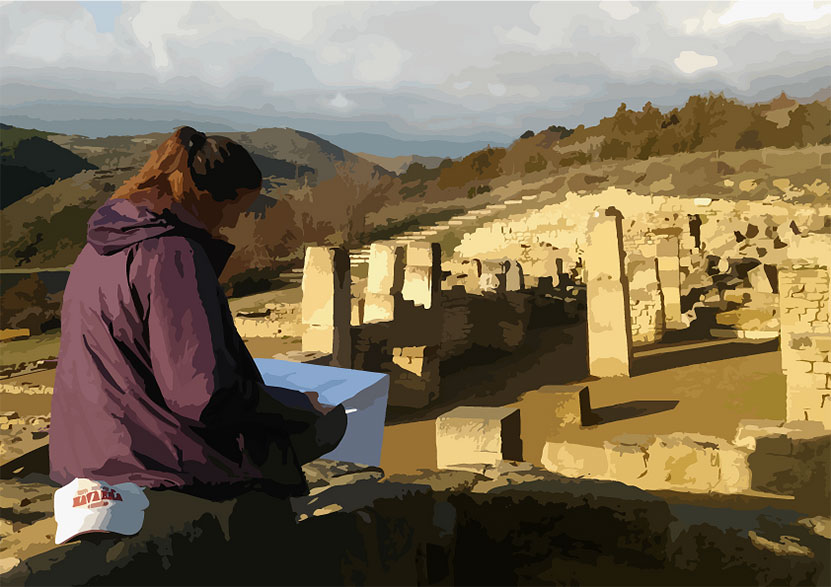 Inmaculada Delage, researcher at the University of Navarra, works on the planimetry of the forum of Santa Cruz de Eslava.
Inmaculada Delage, researcher at the University of Navarra, works on the planimetry of the forum of Santa Cruz de Eslava.
In this early archaeology, what clichés are entrenched?
Quite a few. Archaeologists are confused with palaeontologists. We both share the same method, but they are dedicated to the recovery of fossil remains, and we are dedicated to the recovery of man-made remains, to material culture.
A second cliché is to see us as Indiana Jones. Hollywood presents archaeology as a treasure hunt, but it is not. Any object, whether impressive or not, is historically important if the right questions are asked of it, in terms of human achievement that is a reflection of the society that created it.
Let's focus on the second, real archaeology. Why is it so relevant?
Mainly for two reasons. The first is that it gives a voice to people at secondary levels in ancient societies, such as women or children. Written sources were not interested in them because they lacked political relevance. Now our only way to know their stories is through those little forgotten great objects that were part of their daily trousseau.
The second reason is that it positions us before a past that we recognise as present.. What makes archaeology attractive is the study of how our material culture has evolved over time and how, despite the fact that many centuries have passed since the creation of these objects, we still have the same problems and concerns. We are still the same.
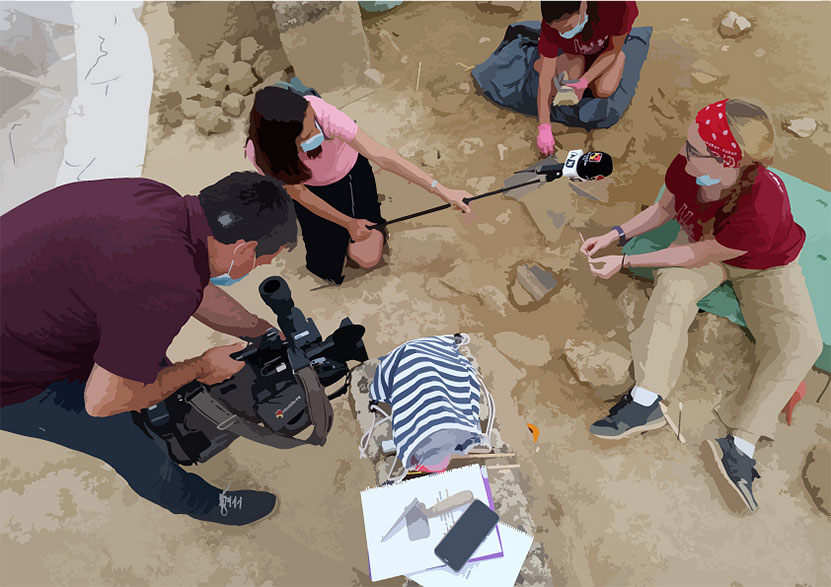 Student from Diploma of Archaeology attends to the media at the excavation of Los Bañales de Uncastillo.
Student from Diploma of Archaeology attends to the media at the excavation of Los Bañales de Uncastillo.
Is this relevance well understood in today's society?
In recent years, yes. Some archaeological projects have been concerned with the socialisation of heritage and with demonstrating that it is a useful resource . This has resulted in an increase in the consumption of archaeotourism products and in the interest of a segment of society in archaeology.
What about the Administration?
There is a commitment at regional and municipal level to heritage, but also, on occasions, an almost total absenteeism on the part of the Autonomous Administration. Currently, the latter sometimes only barely guarantees the management management assistant , but does not invest in research, nor in conservation.
Public investment in subject of research archaeological has become a kind of distribution of misery, without a strategic project for each legislature. It is a status that affects all of us who have a relationship with archaeological heritage.
"Despite being highly protected by legislation, archaeological heritage is the most vulnerable,
archaeological heritage is the most vulnerable".
What about archaeologists - are they professionally recognised?
No, in fact, in the workers' statutes the archaeologist does not exist as a profession, the general construction agreement applies to him/her. It says a lot about the lack of awareness on the part of the administration regarding the profession.
Is the current health situation affecting archaeology?
Professional archaeologists are not particularly affected. The construction agreement has allowed archaeologists to continue working even during periods of state of alarm, as they are considered essential professionals.
Inmy opinion, the coronavirus has taken a bit of a toll on this educational aspect. The archaeological projects that did not have the proactive capacity to seek resources and that worked with students have taken advantage of this year to do nothing from the point of view of researcher and training, for fear of contagion.
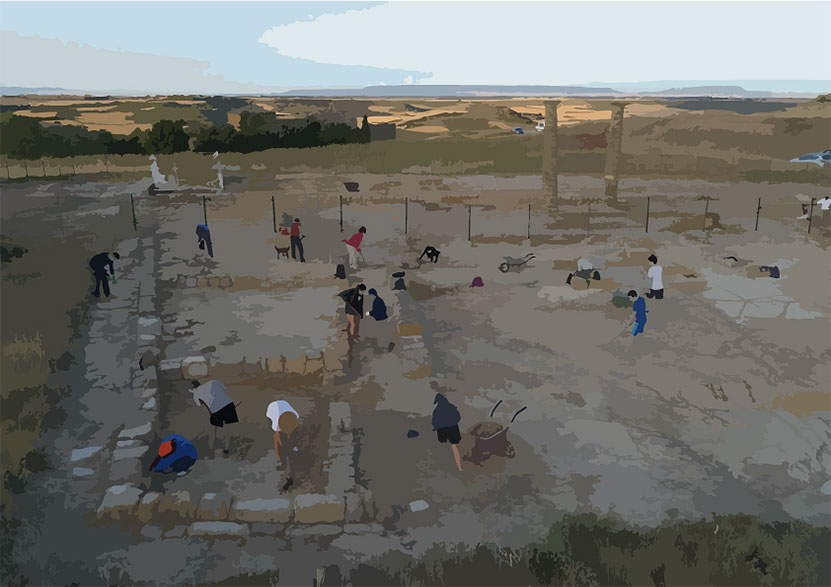 Snapshot of the excavation of Los Bañales de Uncastillo, in the 2020 campaign.
Snapshot of the excavation of Los Bañales de Uncastillo, in the 2020 campaign.
What impact will it have on the sites?
It is too early to tell how this socio-economic crisis will affect archaeological heritage. This year will be a disaster for sites that rely for part of their sustainability and funding on income from guided tours, as visitors travel less. In the precedent we have, the 2008 crisis, investments, which until then were more or less respectable, were at a minimum.
What can archaeology and archaeologists contribute to society in these unstable times?
We are all looking for ways to escape from the current reality, we are saturated with turbulent health information and we are looking for spaces to air ourselves. Archaeological outreach through a good YouTube channel or quality information on social networks about Archaeology can be a window to the past that helps us to separate ourselves from our tormented present.
What future projection do you see for the profession? Decline, reinvention...
Archaeology has a future and it must be reinvented. The strictly technical training is not enough for the new archaeologist. The future lies in a training that creates profiles of archaeologist-historians who also master the tools of speech and management. The crisis we are going through is going to generate an uncertain environment but one that, as far as challenge is concerned, will be exciting.
And for these future archaeologists, a message of hope?
With a good set of skills and techniques, patience, humility, and if the social context is a little bit right, there is hope for a place in the world of archaeology.
These are precisely the values in which we educate our students in our Diploma of Archaeology. Those and a constant capacity for learning, hand in hand with the best, such as the professionals who pass through the Archaeology Seminars offered by the Diploma.
And with a lot of passion.
Indeed, passion is the factor core topic. Add it, add it. (laughs)

